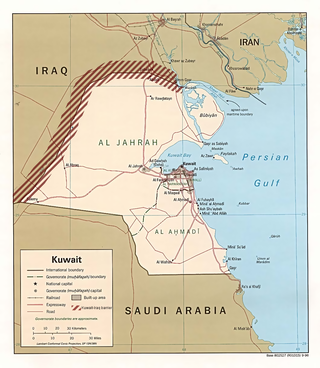
The United Nations General Assembly, UNGA; French: Assemblée générale des Nations unies, AGDNU is one of the six principal organs of the United Nations (UN), serving as its main deliberative, policymaking, and representative organ. Currently in its 79th session, its powers, composition, functions, and procedures are set out in Chapter IV of the United Nations Charter.

A United Nations Security Council resolution (UNSCR) is a United Nations resolution adopted by the Security Council (UNSC), the United Nations (UN) 15-member body charged with "primary responsibility for the maintenance of international peace and security".
A United Nations General Assembly resolution is a decision or declaration voted on by all member states of the United Nations in the General Assembly.

United Nations Security Council Resolution 452, adopted on 20 July 1979, addressed the issue of the Israeli settlements in Jerusalem, the West Bank, Gaza Strip and the Golan Heights, specifically the illegality thereof. It states that "the policy of Israel in establishing settlements in the occupied Arab territories has no legal validity and constitutes a violation of the [Fourth] Geneva Convention relative to the Protection of Civilian Persons in Time of War, of 12 August 1949" and "calls upon the Government and people of Israel to cease, on an urgent basis, the establishment, construction and planning of settlements in the Arab territories occupied since 1967, including Jerusalem."

United Nations Security Council resolution 465, adopted unanimously on 1 March 1980, was on the issue of the Israeli settlements and administration in "the Arab territories occupied since 1967, including Jerusalem", referring to the Palestinian territories of the West Bank including East Jerusalem and the Gaza Strip as well as the Syrian Golan Heights.

United Nations Security Council Resolution 17 was adopted on 10 February 1947. The Council declared that the commission established by Resolution 15 did not have the authority to request the governments of Greece, Albania, Bulgaria, or Yugoslavia to postpone any executions of political prisoners unless the commission believed they could provide testimony helpful to its work.

United Nations Security Council Resolution 48, adopted on April 23, 1948, called on all concerned parties to comply with United Nations Security Council Resolution 46 and to that end established a Truce Commission for Palestine to assist the Security Council in implementing the truce.

United Nations Security Council Resolution 51, adopted on June 3, 1948, reaffirmed previous Council resolutions on the India–Pakistan conflict, directed the Commission established in United Nations Security Council Resolution 39 to move to the areas of dispute and accomplish the duties assigned to it in United Nations Security Council Resolution 47 as soon as possible. The resolution also instructed the Commission to address a letter that was sent to the Council by the Foreign Minister of Pakistan.
United Nations Security Council Resolution 67, adopted on January 28, 1949, satisfied that both parties in the Indonesian Conflict continued to adhere to the principles of the Renville Agreement, the Council called upon the Netherlands to immediately discontinue all military operations and upon the Indonesian Republic to order its armed adherents to cease guerrilla warfare and for both parties to cooperate in the restoration of peace and the maintenance of law and order throughout the area. The Council further called upon the Netherlands to release all political prisoners arrested since December 17, 1948 and to facilitate the immediate return of officials of the Government of the Republic of Indonesia to Jogjakarta and afford to them such facilities as may reasonably be required by that Government for its effective functioning in that area.
United Nations Security Council Resolution 79, adopted on January 17, 1950, having received and the text of United Nations General Assembly Resolution 300 concerning the regulation and general reduction of conventional armaments and armed forces, the Council decided to transmit the resolution to the Commission for Conventional Armaments for further study in accordance with the Commission’s plan of work.

United Nations Security Council Resolution 83, adopted on June 27, 1950, determined that the attack on the Republic of Korea by forces from North Korea constituted a breach of the peace. The Council called for an immediate cessation of hostilities and for the authorities in North Korea to withdraw their armed forces to the 38th parallel. They also noted the report by the United Nations Commission on Korea that stated North Korea's failure to comply with Security Council Resolution 82 and that urgent military measures were required to restore international peace and security.

United Nations Security Council resolution 692, adopted on 20 May 1991, after recalling resolutions 674 (1990), 686 (1991) and 687 (1991), as well as taking the report by the Secretary-General, the council decided to establish the United Nations Compensation Commission to deal with compensation claims resulting from Iraq's invasion of Kuwait, which subsequently led to the Gulf War.

United Nations Security Council resolution 740, adopted unanimously on 7 February 1992, after reaffirming resolutions 713 (1991), 721 (1991), 724 (1991) and 727 (1992) and considering a report by the Secretary-General Boutros Boutros-Ghali, the Council approved plans for a peacekeeping mission in the Socialist Federal Republic of Yugoslavia.

United Nations Security Council resolution 773, adopted on 26 August 1992, after recalling resolutions 687 (1991) and 689 (1991), the Council considered the work of the Iraq–Kuwait Boundary Demarcation Commission established on 2 May 1991, and reiterated its position that it would enforce any violation of the ceasefire in the demilitarised zone.

United Nations Security Council resolution 1134, adopted on 23 October 1997, after recalling resolutions 687 (1991), 707 (1991), 715 (1991), 1060 (1996) and 1115 (1997) on the monitoring of Iraq's weapons programme, the Council demanded that Iraq co-operate with weapons inspection teams from the United Nations Special Commission (UNSCOM) and expressed its intention to impose travel bans on Iraqi officials in the event of non-compliance.

United Nations Security Council Resolution 1646, adopted on 20 December 2005, after recalling Resolution 1645 (2005) adopted immediately prior to this resolution, the council addressed the membership of the United Nations Peacebuilding Commission.

United Nations Security Council Resolution 1734, adopted unanimously on December 22, 2006, after recalling all previous resolutions on the situation in Sierra Leone, including resolutions 1620 (2005) and 1688 (2006), the Council renewed the mandate of the United Nations Integrated Office in Sierra Leone (UNIOSIL) until December 31, 2007.

United Nations General Assembly Resolution 68/262 was adopted on 27 March 2014 by the sixty-eighth session of the United Nations General Assembly in response to the Russian annexation of Crimea and entitled "territorial integrity of Ukraine". The nonbinding resolution, which was supported by 100 United Nations member states, affirmed the General Assembly's commitment to the territorial integrity of Ukraine within its internationally recognized borders and underscored the invalidity of the 2014 Crimean referendum. Eleven nations voted against the resolution, while 58 abstained, and a further 24 states were absent when the vote took place.

The eleventh emergency special session of the United Nations General Assembly opened on 28 February 2022 at the United Nations headquarters. It addresses the Russian invasion of Ukraine. Maldivian politician Abdulla Shahid served as President of the body during this time.












